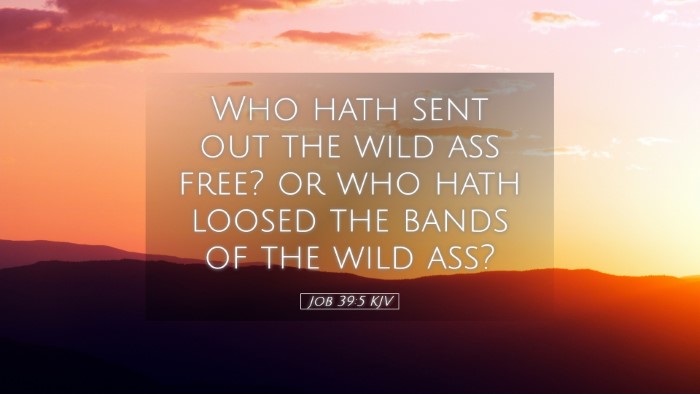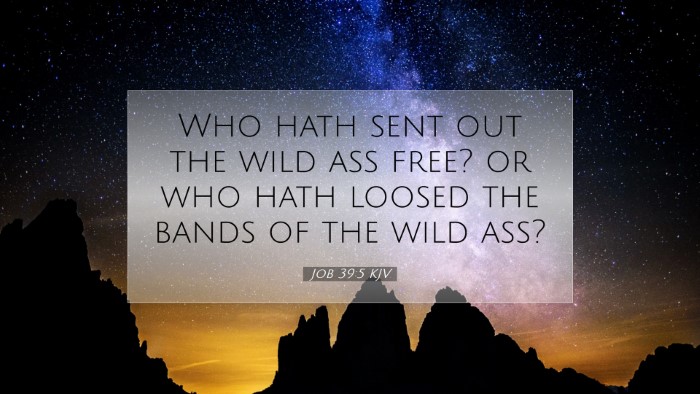Old Testament
Genesis Exodus Leviticus Numbers Deuteronomy Joshua Judges Ruth 1 Samuel 2 Samuel 1 Kings 2 Kings 1 Chronicles 2 Chronicles Ezra Nehemiah Esther Job Psalms Proverbs Ecclesiastes Song of Solomon Isaiah Jeremiah Lamentations Ezekiel Daniel Hosea Joel Amos Obadiah Jonah Micah Nahum Habakkuk Zephaniah Haggai Zechariah MalachiJob 39:5
Job 39:5 KJV
Who hath sent out the wild ass free? or who hath loosed the bands of the wild ass?
Job 39:5 Bible Commentary
Commentary on Job 39:5
Verse: "Who hath sent out the wild ass free? or who hath loosed the bands of the wild ass?" (Job 39:5)
Introduction
The verse under consideration, Job 39:5, is situated within a profound section of the book of Job where God speaks to Job out of the whirlwind. This chapter emphasizes the themes of creation, divine sovereignty, and the intricacies of God’s design in the natural world. It showcases God’s authority and power over all creation, illustrated through a series of rhetorical questions that highlight the majesty of His handiwork.
Contextual Analysis
- Historical Context: The Book of Job is a poetic and philosophical exploration of suffering, righteousness, and divine justice. Job, a man of exemplary character, faced unimaginable trials. In these verses, God directs Job's attention towards creation to reveal His omnipotence.
- Thematic Context: Job 39 is part of a larger discourse (chapters 38-41) where God challenges Job's understanding of the universe. The wild ass symbolizes untamed nature, representing God's control over creatures that are free-spirited and untamed.
Commentary Insights
Matthew Henry's Insights
Matthew Henry emphasizes that the wild ass, known for its strength and freedom, is a testament to God's creation and sovereignty. He points out that the wild ass is not tamed by man but is made free by God, showcasing the Creator's authority to govern all creaturely existence. Henry interprets this freedom as a reflection of God's design in creation, where each creature has its place and purpose. He asserts that God feeds and provides for the wild ass, even in desolate places, reinforcing the idea that God's providence extends to all forms of created life.
Albert Barnes' Commentary
Albert Barnes provides a detailed examination of the verse, noting that the wild ass, or "Ariel," is characterized by its wildness and untamed nature. He interprets the question "Who hath sent out the wild ass free?" as an acknowledgment of God's creative power. Barnes argues that the wild ass lives in the wilderness, away from human civilization, emphasizing its independence and the divine nature of its existence. He asserts that the rhetorical questions serve not only to reaffirm God's supremacy but also to remind Job of humanity's limitations in comprehending divine matters.
Adam Clarke's Interpretation
Adam Clarke, in his exegesis, takes into account the cultural context of the wild ass, identifying it as a creature that thrives in harsh conditions. He writes that the wild ass is an emblem of freedom and strength bestowed by God. Clarke also discusses the symbolism of the wild ass in literature, portraying it as a creature that represents the unrestrained aspects of God’s creation. Clarke encourages readers to reflect on God's ability to create beings that inhabit the extremes of nature, further exemplifying His creativity and authority.
Theological Implications
- Divine Sovereignty: This verse highlights God's control over nature. The wild ass, thriving in its freedom, operates according to God’s design, underscoring the sovereignty exerted over all creatures, both domestic and wild.
- Creation's Testimony: The wild ass serves as a reminder of God's intricate design in creation. Each creature has inherent worth and reflects aspects of God's character, inviting an appreciation for the biodiversity of life.
- Human Limitation: Job is reminded of his limitations in understanding the complexities of God’s creations. This acknowledgment positions humanity in a humble stance before God’s majestic works.
Application for Pastors and Theologians
This passage serves as a profound reminder for ministry and theological reflection. Pastors are encouraged to embrace the imagery of God's creation in their preaching, using analogies drawn from nature to illustrate divine truths.
The acknowledgment of God's sovereign hand in all things can encourage believers to trust in His providence and control amidst the challenges of life. Additionally, it calls for a deeper appreciation of the natural world and a commitment to stewardship, reflecting God's design and care for all creation.
Conclusion
Job 39:5 serves as a pivotal verse that encapsulates significant theological themes and insights into God's character as Creator. Through examining authoritative commentaries, we gain a rich understanding of the layered meanings embedded in this verse. By recognizing God’s sovereignty and reflecting on the nature of creation, we find a call to humility, reverence, and stewardship that remains pertinent to all who seek to understand the depths of divine wisdom.


